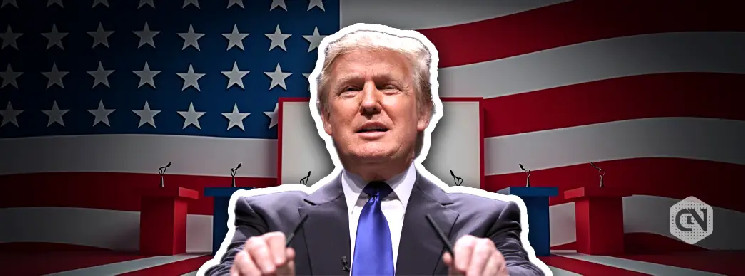World Liberty Financial, a crypto project connected to former U.S. President Donald Trump, plans to introduce a stablecoin, according to sources familiar with the company’s development strategy. Following its initial token sale, which raised $14 million, the crypto project aims to launch a stable cryptocurrency that could be pegged to the U.S. dollar.
Donald Trump to Launch Stablecoin
Stablecoins, by design, offer users a digital asset meant to maintain a consistent value, a feature seen as essential for steady trading amidst crypto market volatility. However, achieving the stability required for such an asset has posed challenges for many similar initiatives.
According to individuals with knowledge of the project’s operations, creating a safe and reliable financial product remains a primary goal. While the development process could take some time, World Liberty Financial’s team is focused on ensuring that all major project features are synchronized and available when they’re most strategically viable.
One source explained that work on the stablecoin continues in parallel with other elements. They said, “The team is working concurrently on major project components for World Liberty Financial, including the stablecoin,” according to a Decrypt report.
A recent announcement naming Rich Teo, co-founder of Paxos, a prominent stablecoin issuer, as the head of stablecoin and payment operations for World Liberty Financial has further fueled speculation about the initiative’s ambitions. However, Teo has not commented on the matter, and representatives from World Liberty Financial also declined to respond.
TRUMP CRYPTO PROJECT WORLD LIBERTY PLANS TO ISSUE STABLECOIN, SOURCES SAY
Donald Trump’s controversial crypto project, World Liberty Financial—which recently raised $14 million in an initial token sale—has plans to create and issue its own stablecoin, sources familiar with the…
— *Walter Bloomberg (@DeItaone) October 28, 2024
Nevertheless, the project’s moves have raised interest and sparked debates, particularly given the project’s plans for an Ethereum-based lending and borrowing platform with direct associations to Donald Trump.
Stablecoin Regulatory Landscape & Challenges
Stablecoins are now considered an essential part of the crypto ecosystem as they allow users to shield their investments in a currency less prone to market swings. Also, they facilitate conversions between cryptocurrencies and traditional fiat currency. However, the regulatory landscape surrounding stablecoins in the U.S. remains uncertain.
The Securities and Exchange Commission (SEC) has previously pursued legal action against crypto firms, including Binance, on the grounds of allegedly issuing unregistered securities in the form of stablecoins. Although these charges were dropped earlier this year, a pending debate in Congress could affect the future of such assets.
If Donald Trump is re-elected, he may be uniquely positioned to influence both the regulatory and operational dynamics of the industry. He may face the Congress on stablecoin legislation while his business partners continue to expand their crypto products.
With potential profits on the horizon, the revenue model for stablecoins like those envisioned by World Liberty Financial is clear. Stablecoin providers earn by reinvesting customer deposits in high-yield products, including U.S. Treasury bills. The British Virgin Islands-based Tether, which leads the stablecoin market, recorded $5.2 billion in profits in the first half of 2024.
According to industry insiders, stablecoin projects require significant collateral to support a pegged value. Circle, a U.S.-based stablecoin issuer, disclosed that it holds over $34 billion in dollar-backed reserves at regulated institutions to support its USDC stablecoin. Thus, amid regulatory hurdles and heavy competition, World Liberty Financial must secure support from major exchanges like Coinbase and Binance to reach its target audience effectively.
Trump’s venture might gain leverage in negotiations with exchanges, given that both Binance and Coinbase are embroiled in legal battles with the SEC, potentially affecting their long-term operations. Notably, Trump’s transition team co-chair is also the CEO of Cantor Fitzgerald, the asset manager holding a significant portion of Tether’s reserves, creating a web of connections that could aid the launch of a new stablecoin.
Meanwhile, Trump’s criticism of a U.S. government-issued central bank digital currency (CBDC) contrasts with his endorsement of stablecoins. Speaking at a campaign event in New Hampshire, he remarked, “Such a currency would give the federal government—our government—the absolute control over your money.” He added, “They could take your money. You wouldn’t even know it was gone.”
 cryptonewsz.com
cryptonewsz.com
